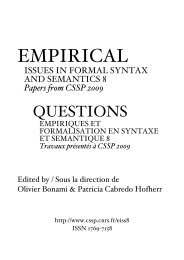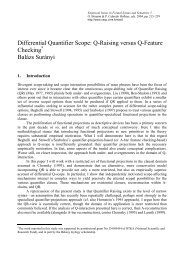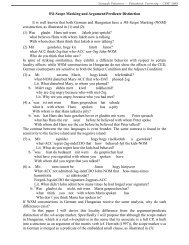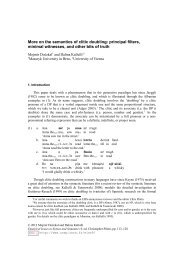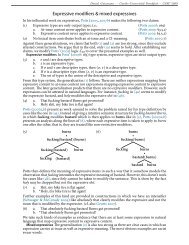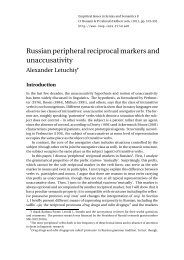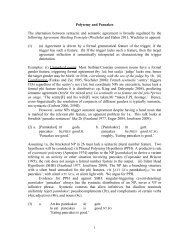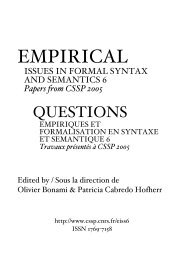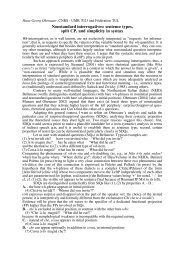Empirical Issues in Syntax and Semantics 9 (EISS 9 ... - CSSP - CNRS
Empirical Issues in Syntax and Semantics 9 (EISS 9 ... - CSSP - CNRS
Empirical Issues in Syntax and Semantics 9 (EISS 9 ... - CSSP - CNRS
You also want an ePaper? Increase the reach of your titles
YUMPU automatically turns print PDFs into web optimized ePapers that Google loves.
situations (described by the head <strong>and</strong> the embedded clauses), the embedded clause<br />
expresses a proposition to the truth of which an agent is committed.<br />
Although <strong>in</strong> l<strong>in</strong>e with (3), the def<strong>in</strong>ition <strong>in</strong> (20) is a bit more complicated. Note first that we<br />
do not relativize the condition to predicate classes, which are taken <strong>in</strong>to account <strong>in</strong>directly, by<br />
the effect they have on the <strong>in</strong>terpretation of the complement clause: verbs of communication, of<br />
perception <strong>and</strong> propositional attitudes have <strong>in</strong> common that the complement clause expresses a<br />
proposition with an <strong>in</strong>dependent truth value; <strong>in</strong> addition, at least when the head clause is<br />
positive <strong>and</strong> declarative, they imply that an agent is committed to the truth value of this<br />
proposition. In general, this agent is denoted by the subject of the head verb: it is the (entity<br />
denoted by the) subject of affirmer, penser, subodorer <strong>in</strong> (6)–(8), décider, prédire, prévoir,<br />
anticiper <strong>in</strong> (10) <strong>and</strong> (11), who is committed to the truth of the proposition. In such cases, the<br />
speaker is not <strong>in</strong>volved <strong>in</strong> the commitment. In other cases, the speaker himself is the agent<br />
rather than the subject, as for <strong>in</strong>stance, with verbs such as ignorer ‘ignore’, oublier ‘forget’; <strong>in</strong><br />
still other cases, the predicate implies that the subject is committed but is not to be believed, as<br />
with s’imag<strong>in</strong>er ‘imag<strong>in</strong>e’, prétendre ‘claim’ (see Soutet 2000:60). With an impersonal<br />
construction, the agent is either realized by an argument of the impersonal verb (21a), or<br />
contextually specified. It may be identified with the subject of a higher clause whose verb<br />
belongs to the same classes (21b), or it corresponds to the speaker (21c), or it can be enlarged to<br />
discourse participants, or people <strong>in</strong> general (21d).<br />
(21) a. Il lui / nous semble évident que le niveau de vie a augmenté.<br />
It seems to him/us that the st<strong>and</strong>ard of liv<strong>in</strong>g has improved<br />
b. Paul pense qu’il est évident que le niveau de vie a augmenté.<br />
Paul th<strong>in</strong>ks that it is evident that the st<strong>and</strong>ard of liv<strong>in</strong>g has improved<br />
c. Il est évident que le niveau de vie a augmenté. Tu es bien d’accord ?<br />
It is evident that the st<strong>and</strong>ard of liv<strong>in</strong>g has improved. You agree, I suppose<br />
d. Il est évident que le niveau de vie a augmenté. Personne ne dira le contraire.<br />
It is evident that the st<strong>and</strong>ard of liv<strong>in</strong>g has improved. Nobody will disagree<br />
The reason why the condition cannot simply refer to the head predicates is that the mood<br />
may change if the predicate is negated or occurs <strong>in</strong> an <strong>in</strong>terrogative clause (see (22) <strong>and</strong> below<br />
§4.3). On the other h<strong>and</strong>, it is not possible either to simply refer to the <strong>in</strong>terpretation of the<br />
embedded clause. The reason is that there are cases where the <strong>in</strong>terpretation of the whole<br />
sentence does not imply the existence of an agent committed to the truth of the embedded<br />
clause, as when the head predicate is <strong>in</strong> a modal environment (23). Hence, we must take <strong>in</strong>to<br />
account the <strong>in</strong>terpretation <strong>in</strong>duced by the properties of the head clause (where the <strong>in</strong>f<strong>in</strong>itival VP<br />
<strong>in</strong> (23a) counts as a clause). However, the <strong>in</strong>fluence of the context rema<strong>in</strong>s local, <strong>and</strong> does not<br />
go further than the clause conta<strong>in</strong><strong>in</strong>g the head predicate.<br />
(22) Je ne crois pas que nous en {sommes IND / soyons SUBJ } capables.<br />
I don’t th<strong>in</strong>k that we are capable of this<br />
(23) a. Paul {peut / doit} penser que le niveau de vie {a IND / *ait SUBJ } augmenté.<br />
Paul may / must th<strong>in</strong>k that the st<strong>and</strong>ard of liv<strong>in</strong>g has improved<br />
b. Il est possible que Paul dise que le niveau de vie {a IND / *ait SUBJ } augmenté.<br />
It is possible that Paul says that the st<strong>and</strong>ard of liv<strong>in</strong>g has improved<br />
135



